The University of Alabama at Birmingham Comprehensive Cancer Center has received a five-year, $29 million Cancer Center Support Grant from the National Cancer Institute to renew support for its cancer research program through 2021. The Cancer Center will receive nearly $6 million per year to support six research programs, as well as 14 shared facilities and services.
The Cancer Center Support Grant is the most prestigious federal grant that can be earned by an institution with significant cancer research and patient-care programs. The renewal also extends UAB’s elite “comprehensive” designation, which is characterized by scientific excellence and the ability to integrate diverse research approaches in the fight against cancer.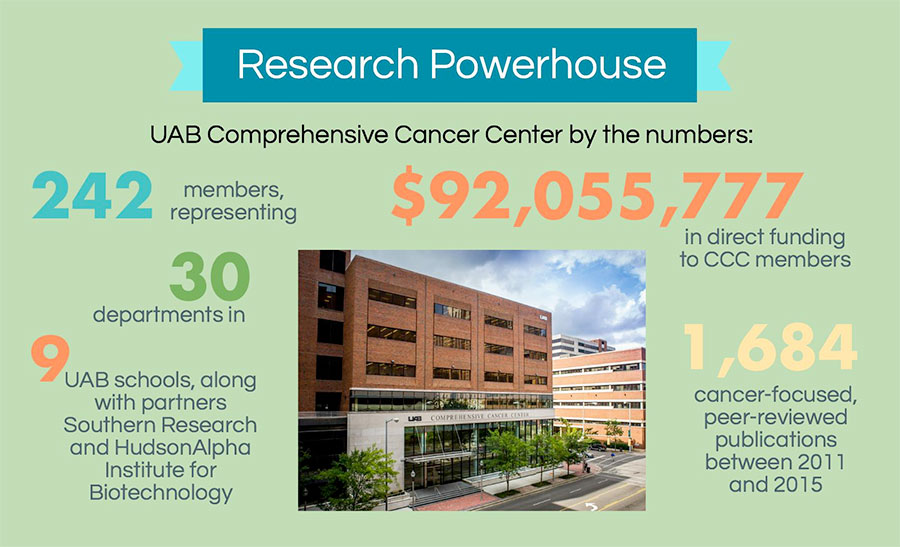
Funding to help eliminate cancer threat
“I believe that by 2050 we can eliminate cancer as a public health problem,” said Edward Partridge, M.D., director of the UAB Comprehensive Cancer Center. “That doesn’t mean cancer will go away, but that we can treat cancer just like we do other diseases. We want to get to the point where we can prevent, detect early and manage the disease, so patients can lead long, productive lives. This critical funding from the NCI helps us get there. We are now poised to take our research to the next level and deliver new and advanced treatments to our patients as quickly and safely as possible.”
For NCI core grant renewal, the Cancer Center undergoes a competitive and rigorous peer-review process which includes a written and in-person site evaluation that happens every five years.
“To get our comprehensive designation, we go through the same process as every other NCI-designated center, whether it’s MD Anderson or Memorial Sloan-Kettering,” Partridge said. There is absolutely no difference in how we are evaluated based on quality of science and care.”
| “I believe that by 2050 we can eliminate cancer as a public health problem.” —Edward Partridge, M.D., director of the UAB Comprehensive Cancer Center. |
This year, the Cancer Center received an “outstanding” rating, its highest ever, and was recognized for its growth and expertise in its translational capabilities of bringing basic scientific discoveries into the clinic, as well as demonstrating the depth and breadth in laboratory, clinical and population-based research.
Although researchers receive grants that support their research, NCI funding provides the infrastructure to extend their capabilities for maximized productivity. For example, a large portion of the grant sustains core facilities, which are shared research resources that house state-of-the-art technologies and expertise that investigators could not otherwise afford. The funding also supports leadership, so they can coordinate and promote the growth of research programs and initiatives and recruit new faculty. A portion also goes to develop young scientists and for administrative functions.
“Bottom line, our core grant provides the infrastructure to support all our scientists who strive every day to reduce the cancer burden,” Partridge said.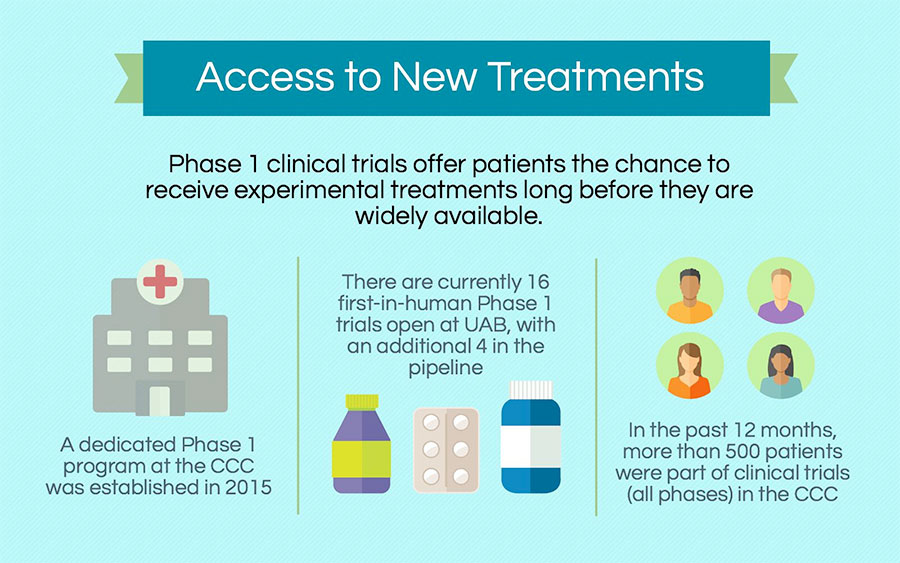
Research powerhouse
The UAB Comprehensive Cancer Center is one of only 45 NCI-designated “comprehensive” cancer centers in the United States, and the only one in Alabama and the Deep South region. Mortality rates for cancer are substantially higher in this part of the country, which also has a higher population of African-Americans. The Cancer Center’s basic science and translational therapeutic programs conduct research that is highly relevant to this population, including leading efforts in triple-negative breast cancer, multiple myeloma, prostate cancer and skin cancer.
“We have the moral obligation to provide our constituents the best care we can, and for us that begins with our research enterprise,” Partridge said.
The Cancer Center’s prevention and control programs have emphasis in reducing disparities and incorporating age-appropriate screening, diet and physical activity, and tobacco-use reduction, all more problematic in African-American and other traditionally underserved populations. Obesity has an especially dramatic impact in this part of the country, and researchers are working hard to determine what this means for cancer, as well as surviving the disease once it is diagnosed.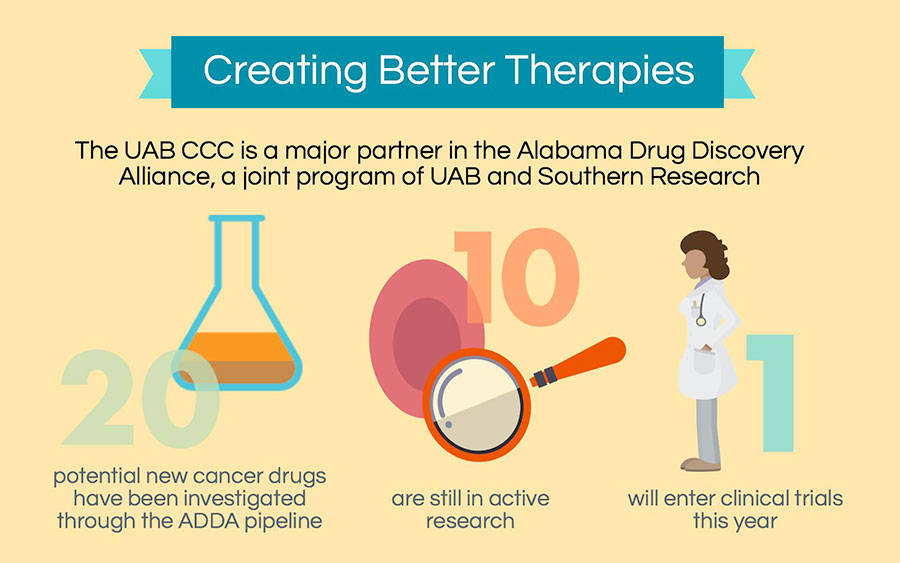
Why NCI designation matters to patients
For many, an NCI designation can hold the key to survival, and studies have been done to support that conclusion. Smita Bhatia, M.D., MPH, director of the UAB Institute of Cancer Outcomes and Survivorship was recruited to UAB from City of Hope in Los Angeles in 2015.
“We have shown that, among individuals ages 22 to 65 years residing in Los Angeles County with newly diagnosed adult-onset cancer, those who were treated at NCI-designated comprehensive cancer centers experienced superior survival compared with those treated at other facilities,” Bhatia said.
A comprehensive designation also means patients have access to leading-edge treatments or “clinical trials” they may not otherwise have at local community hospitals or smaller cancer centers. At UAB, there are more than 180 cancer-related clinical trials exploring an array of therapies, diagnostics and preventive options.
The designation also means the specialized physicians who see patients in the clinic are collaborating with researchers in the lab to develop new approaches to detecting, preventing and treating cancer for all populations.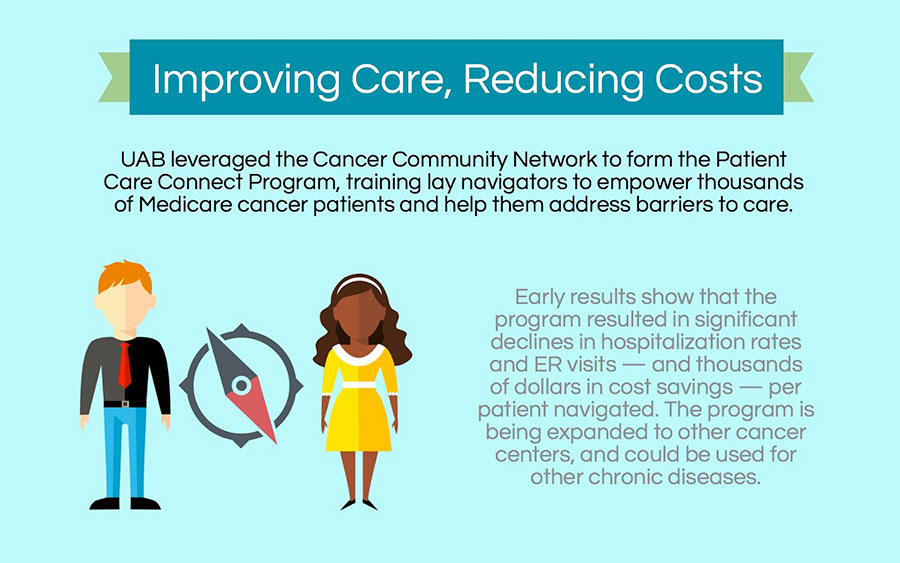
Innovative cancer initiatives
Since its last NCI renewal in 2011, the Cancer Center has substantially enhanced research capabilities and infrastructure in several impactful ways:
- Optimized the Alabama Drug Discovery Alliance: The ADDA facilitates drug discovery and development by combining the complementary resources that exist at UAB and Southern Research. There are 10 cancer projects in the works for drug development in the ADDA.
- ·Created the UAB Cancer Center/HudsonAlpha Institute for Biotechnology Consortium: The consortium with the Huntsville-based company provides a platform for building research teams focused on cancer and integrating genomic information into efforts to identify risk, prevent disease and direct personalized therapy; use wide-scale genomic sequencing to discover genes responsible for cancer development and progression; and educate members of the Cancer Center so they can apply genomic information to their research and patient care.
- Developed a dedicated Phase I Clinical Trials unit and program: The Phase I Unit provides a much-needed facility for first-in-human studies at UAB, in which patients can receive both FDA-approved and experimental drugs in one centralized location. The program has 16 first-in-human phase I trials open, and has four more in the clinical trial review pipeline.
- Launched the UAB Health System Cancer Community Network and Patient Care Connect:The network consists of 12 hospitals across Alabama, Florida, Georgia, Mississippi and Tennessee that emphasize collaboration between UAB and community cancer centers on evidence-based guidelines for cancer treatment of patients in local communities. The overall idea is to bring cancer care closer to home while reinforcing UAB’s best practices. The network was used to test an innovative new concept in cancer care using lay navigation across the continuum of care to support better health, better health care and lower costs.
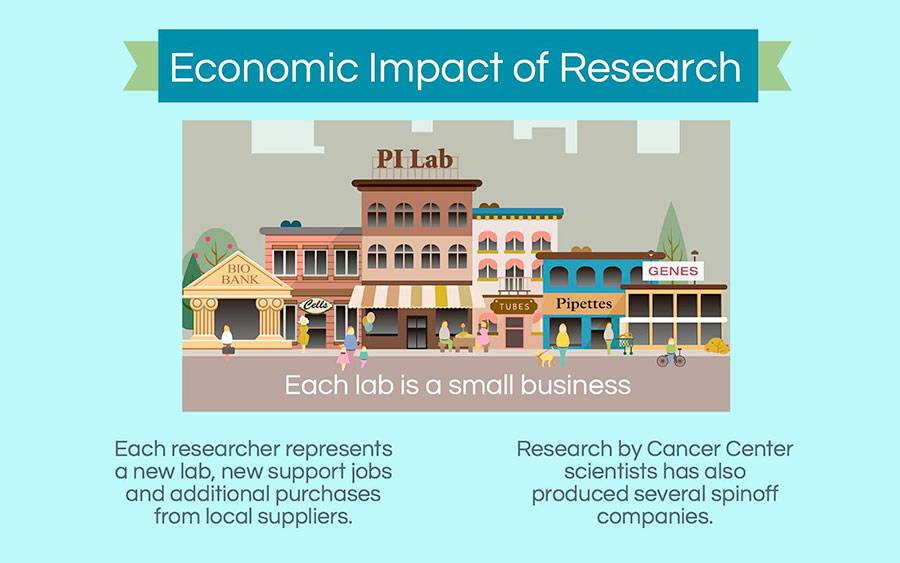 An economic engine at work
An economic engine at work
The UAB Comprehensive Cancer Center is a significant part of the economic engine that drives Birmingham and the region. “Every research lab we have is like a small business,” Partridge said. “When you attract high-caliber faculty and researchers, the impact trickles down to the community. Our recruits buy homes and settle their families here; but they also support the scientific workforce, for example, by hiring supply and equipment vendors, contractors and laborers for the construction and renovation of laboratory facilities, as well as administrators and managers who support the research infrastructure.”
Since 2010, the Cancer Center has recruited 63 investigators to its multiple programs. They include renowned senior clinician scientists such as Harry Erba, M.D., Ph.D., hematological malignancies; Ravi Bhatia, M.D., hematopoietic stem cell transplantation; Smita Bhatia, M.D., MPH, pediatrics and cancer outcomes and survivorship; Mansoor Saleh, M.D., phase I clinical trials; Herbert Chen, M.D., surgery; and Ichiro Nakano, M.D., Ph.D., neuro-oncology.
Many senior faculty serve as professional mentors to young investigators. The Cancer Center has already expanded its training programs, particularly its partnership with the Morehouse School of Medicine and Tuskegee University that develops a pipeline of prospective minority investigators at MSM and TU to further expand cancer disparity research.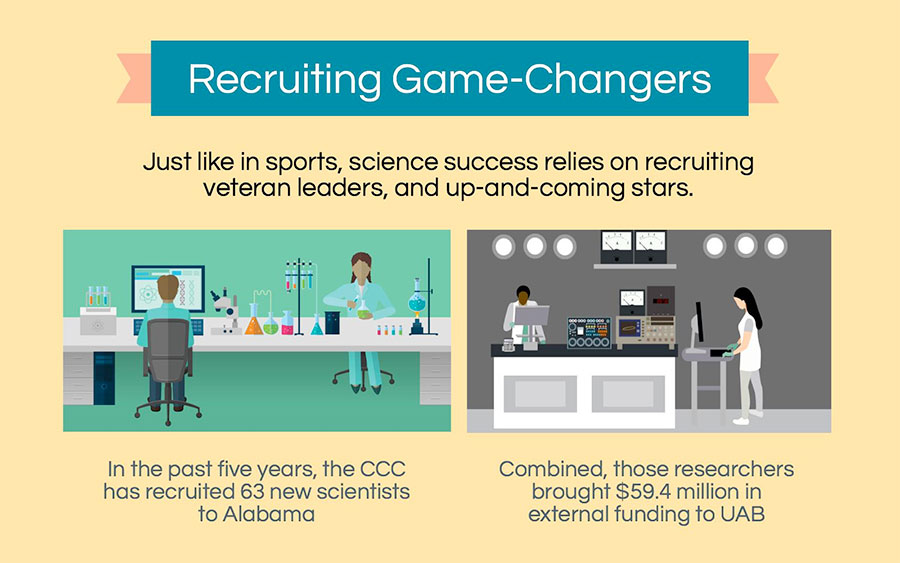
Future plans
The Cancer Center will continue to emphasize translational and cancer disparity research, and will also focus on such promising cancer hot spots as immunotherapy, microbiome, genomics and energetics.
“This grant provides the basis for us to pursue excellence in all of the areas of our mission, including cutting-edge clinical care, translational research, education and the economic development of our community,” said Selwyn M. Vickers, M.D., FACS, senior vice president for Medicine and dean of the UAB School of Medicine. “By strengthening our programs and creating inter-programmatic synergies, we will continue to build on the rich history of accomplishments and will continue to contribute to the national efforts to defeat cancer and simultaneously address the specific and unique needs of our area.”
At any given time, hundreds of research projects and clinical studies are underway at the Cancer Center.
“Comprehensive cancer centers, with their new discoveries, are the primary conduit for delivering advanced care to patients and their families,” Partridge said. “This sizeable award, with the highest level of designation, is essential for the investment in new science.”